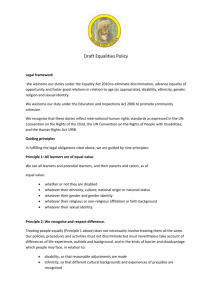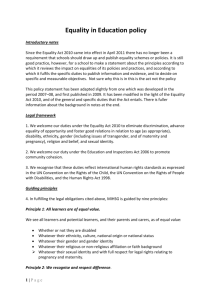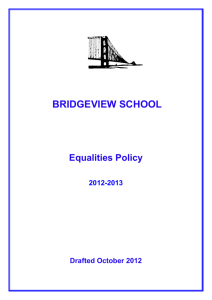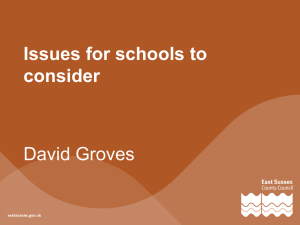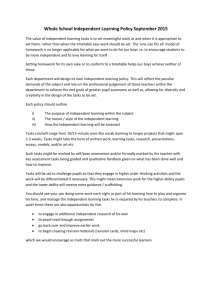STEP Academy Trust Equalities Policy
advertisement
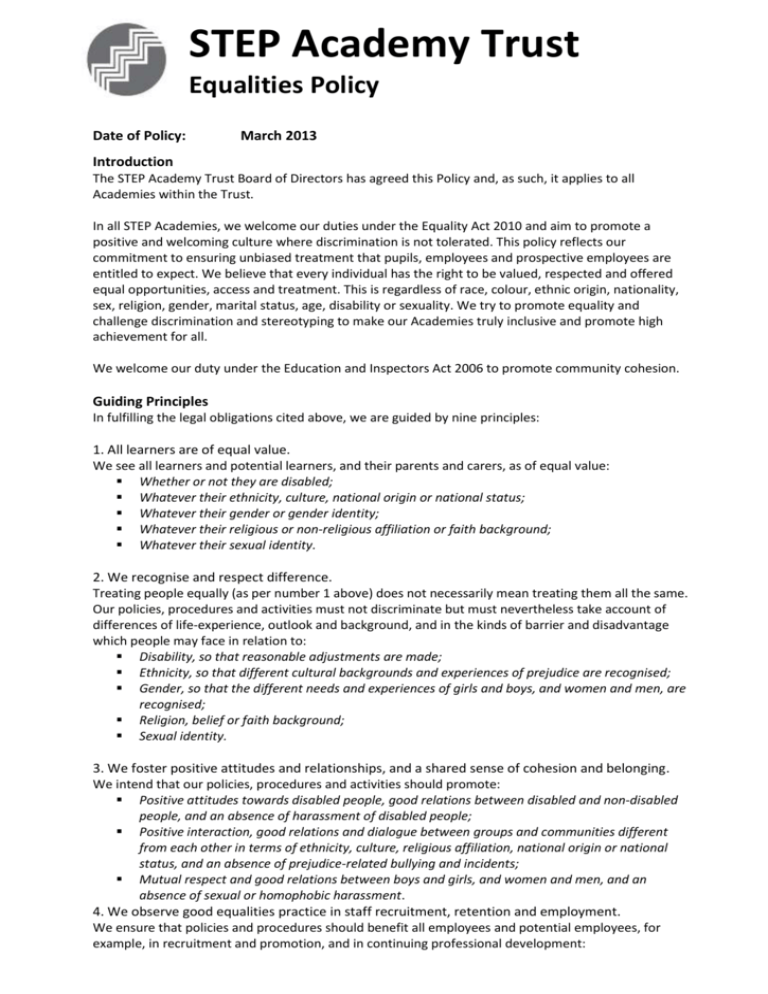
STEP Academy Trust Equalities Policy Date of Policy: March 2013 Introduction The STEP Academy Trust Board of Directors has agreed this Policy and, as such, it applies to all Academies within the Trust. In all STEP Academies, we welcome our duties under the Equality Act 2010 and aim to promote a positive and welcoming culture where discrimination is not tolerated. This policy reflects our commitment to ensuring unbiased treatment that pupils, employees and prospective employees are entitled to expect. We believe that every individual has the right to be valued, respected and offered equal opportunities, access and treatment. This is regardless of race, colour, ethnic origin, nationality, sex, religion, gender, marital status, age, disability or sexuality. We try to promote equality and challenge discrimination and stereotyping to make our Academies truly inclusive and promote high achievement for all. We welcome our duty under the Education and Inspectors Act 2006 to promote community cohesion. Guiding Principles In fulfilling the legal obligations cited above, we are guided by nine principles: 1. All learners are of equal value. We see all learners and potential learners, and their parents and carers, as of equal value: Whether or not they are disabled; Whatever their ethnicity, culture, national origin or national status; Whatever their gender or gender identity; Whatever their religious or non-religious affiliation or faith background; Whatever their sexual identity. 2. We recognise and respect difference. Treating people equally (as per number 1 above) does not necessarily mean treating them all the same. Our policies, procedures and activities must not discriminate but must nevertheless take account of differences of life-experience, outlook and background, and in the kinds of barrier and disadvantage which people may face in relation to: Disability, so that reasonable adjustments are made; Ethnicity, so that different cultural backgrounds and experiences of prejudice are recognised; Gender, so that the different needs and experiences of girls and boys, and women and men, are recognised; Religion, belief or faith background; Sexual identity. 3. We foster positive attitudes and relationships, and a shared sense of cohesion and belonging. We intend that our policies, procedures and activities should promote: Positive attitudes towards disabled people, good relations between disabled and non-disabled people, and an absence of harassment of disabled people; Positive interaction, good relations and dialogue between groups and communities different from each other in terms of ethnicity, culture, religious affiliation, national origin or national status, and an absence of prejudice-related bullying and incidents; Mutual respect and good relations between boys and girls, and women and men, and an absence of sexual or homophobic harassment. 4. We observe good equalities practice in staff recruitment, retention and employment. We ensure that policies and procedures should benefit all employees and potential employees, for example, in recruitment and promotion, and in continuing professional development: Whether or not they are disabled; Whatever their ethnicity, culture, religious affiliation, national origin or national status; Whatever their gender and sexual identity, and with full respect for legal rights relating pregnancy and maternity. 5. We aim to reduce and remove equalities and barriers that already exist. In addition to avoiding or minimising possible negative impacts of our policies, we take opportunities to maximise positive impacts by reducing and removing inequalities and barriers that already exist between: Disabled and non-disabled people; People of different ethnic, cultural and religious backgrounds; Girls and boys, women and men. 6. We consult and involve widely. We engage with a range of groups and individuals to ensure that those who are affected by policy or activity are consulted and involved in the design of new policies, and in the review of existing ones. We consult and involve: Disabled and non-disabled people; People from a range of ethnic, cultural and religious backgrounds; Both men and women, girls and boys; People of differing sexual orientations. 7. Society as a whole should benefit. We intend that our policies and activities should benefit society as a whole, both locally and nationally, by fostering greater social cohesion, and greater participation in public life of: Disabled and non-disabled people; A wide range people from differing ethnic, cultural and religious backgrounds; People of differing sexual orientations. 8. We base our practices on sound evidence. We maintain and publish qualitative information showing our compliance with the public sector equality duty (PSED) set out in clause 149 of the Equality Act 2010. See Appendix A 9. Objectives We formulate and publish specific and measurable objectives, based on the evidence we have collected published (as per 8 above) and the engagement in which we have been involved (as per 7 above). The objectives which we identify take into account national and local priorities and issues as appropriate. We continually review our equality objectives and report annually on progress towards achieving them. Action by 6 April 2012 Schools need to publish information showing how they are meeting their duty to have due regard for equalities, and to publish objectives which show how they will better their performance in this area. See Appendix A for an example of how STEP Academies can approach this. The curriculum We keep each curriculum subject or area under review in order to ensure that teaching and learning reflect the principles set out in the Guiding Principles. Ethos and organisation We ensure that principles listed in paragraph 4 above apply to the full range of policies and practices, including those concerned with: Pupils’ progress, attainment and achievement; Pupils’ personal development, welfare and well-being; Page 2 STEP Academy Trust - Equalities Policy Teaching styles and strategies; Admissions and attendance; Staff recruitment, retention and professional development; Care, guidance and support; Behaviour, disciplines and exclusions; Working in partnership with parents, carers and guardians; Working with the wider community. Addressing prejudice and prejudice-related bullying STEP Academies are opposed to all forms of prejudice which stand in the way of fulfilling the legal duties: Prejudices around disability and special educational needs. Prejudices around racism and xenophobia, including those that are directed towards religious groups and communities for example anti-Semitism and Islamophobia, and those that are directed against Travellers, migrants, refugees and people seeking asylum; Prejudices reflecting sexism and homophobia. There is guidance available to all in STEP Academies on how prejudice related incidents should be identified, assessed and dealt with. We keep a record of prejudice related incidents if any and provide a report to the local authority about the numbers, types and seriousness of prejudice related incidents at our Academies and how they are dealt with. See Appendix C Roles and responsibilities The governing body is responsible for ensuring that their Academy complies with legislation, and that this policy and related procedures and action plans are implemented. A member of the governing body has a watching brief regarding the implementation of this policy. The headteacher is responsible for implementing the policy: for ensuring that all staff are aware of their responsibilities and are given appropriate training and support; and for taking appropriate action in cases of unlawful discrimination. The SLT has day-to-day responsibility for coordinating implementation of the policy. All staff are expected to: Promote an inclusive and collaborative ethos in their classroom; Deal with any prejudice related incidents that may occur; Plan and deliver curricula and lessons that reflect the principle sin paragraph 4 above; Support pupils in their class for whom English is an additional language; Keep up to date with equalities legislation relevant to their work. Information and resources We ensure that the content of this policy is known to all staff and governors and, as appropriate, to all pupils and their parent and carers. All staff and governors have access to a selection of resources which discuss and explain concepts of quality, diversity and community cohesion in appropriate detail. See Appendix B Religious observance We respect the religious beliefs and practice of all staff, pupils and parents, and comply with reasonable requests relating to religious observance and practice. Staff development and training We ensure that all staff, including support and administrative staff, receive appropriate training and opportunities for professional development, both as individuals and as groups or teams. Breaches of policy Breaches of this policy will be dealt with in the same ways that breaches of other STEP Academy policies are dealt with, as determined by the head teacher and governing body Page 3 STEP Academy Trust - Equalities Policy Monitoring and review We collect, study and use quantative and qualitative data relating to the implementation of this policy, and make adjustments as appropriate. In particular we collect, analyse and use data in relation to achievement, broken down as appropriate according to disabilities and special educational needs; ethnicity, and gender. Definitions Racism: The accepted definition of a racist incident, following the “Macpherson Report”, is: “any incident which is perceived to be racist by the victim or any other person.” Disability: The Disability Discrimination Act 1995 defines a disabled person as someone who has a ‘physical or mental impairment which has a substantial and long-term effect on his or her ability to carry out normal day-to-day activities’. According to the DDA, an impairment is to be treated as affecting the person’s ability to carry out normal day-to-day activities, only if it affects one or more of the following: Mobility; Manual dexterity; Physical co-ordination; Continence; Ability to lift, carry or otherwise move everyday objects; Speech, hearing or eyesight; Memory or ability to concentrate, learn or understand and perception of the risk of danger. Religion or Belief: The Equality Act defines “religion” as being any religion, and “belief” as any religious or philosophical belief. A lack of religion or a lack of belief are also protected characteristics. These definitions are fairly broad and the concepts of religion and belief therefore must be construed in accordance with Article 9 of the European Convention on Human Rights and with existing case law. Sex/Gender: STEP Academies need to make sure that pupils of one sex are not singled out for different and less favourable treatment from that given to other pupils. They should check that there are no practices which could result in unfair, less favourable treatment of boys or girls. For example, it would be unlawful for an Academy to require girls to learn needlework while giving boys the choice between needlework and woodwork classes. This policy is to be read in conjunction with our Safeguarding Policies and Equality Policies: Child Protection; Safeguarding; Intimate Care; Positive Handling; Anti-Bullying; Behaviour; Health and Safety; Code of Conduct setting out standards and acceptable behaviour for staff; E-Safety and ICT acceptable use; Managing allegations of abuse against staff; Admission; Whistleblowing. Page 4 Gender; Disability; Race Equality; Special Educational Needs. STEP Academy Trust - Equalities Policy
